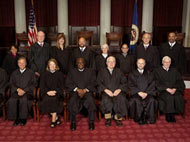Article from: www.thenewspaper.com/news/20/2001.asp
10/4/2007
Minnesota Appeals Court Rules Police May not Seize Blood
The Minnesota Court of Appeals rules that blood may not be drawn from a motorist by force without a warrant.
 The Minnesota Court of Appeals ruled Tuesday that police may not, without a warrant, use force to take blood from a motorist suspected of driving under the influence of alcohol (DUI).
The Minnesota Court of Appeals ruled Tuesday that police may not, without a warrant, use force to take blood from a motorist suspected of driving under the influence of alcohol (DUI).
The case of Janet Sue Shriner, 47, was not decided on sympathy for the defendant. While driving on the wrong side of the road, Shriner had crashed into another car on May 8, 2006 at around 9:26pm in Burnsville. Shriner then fled, leaving behind the injured driver. Once Burnsville Police Officer Maksim Yakovlev caught up to Shriner, he had to use force to bring her vehicle to a stop. Yakovlev then had to break open Shriner's window to open the door and forcibly remove her from the vehicle.
Taken to the Fairview Ridges Hospital, Yakovlev ordered staff to draw Shriner's blood, without first seeking consent from the uninjured motorist or a search warrant from a magistrate. Afterward, a total of seven criminal charges were filed against Shriner. A Dakota County District Court judge dismissed DUI and criminal vehicle operation charges because the blood test evidence was obtained improperly -- leaving five remaining charges.
The appeals court this week upheld the dismissal on the grounds that, under the circumstances, the officer had enough time to obtain a warrant. Without an urgent need to justify ignoring the warrant requirement, the evidence was inadmissible.
"The Fourth Amendment represents a fundamental public policy of protecting personal privacy and dignity against unwarranted intrusion by the state," Judge David Minge wrote in the 2-1 decision. "On this record where no extenuating circumstance other than the evanescent quality of alcohol is present, we conclude the district court did not err in holding that the police officer must obtain the driver's consent or obtain a warrant."
Judge Minge suggested that any showing of inability to reach a judge in time would likely be sufficient to allow the forced drawing of blood.
"In reaching this conclusion, we emphasize that the exigent-circumstances requirement is not a high threshold."
The full text of the decision is available in a 45k PDF file at the source link below.
Source: Minnesota v. Shriner (Court of Appeals, State of Minnesota, 10/2/2007)
Permanent Link for this item
Return to Front Page
 The Minnesota Court of Appeals ruled Tuesday that police may not, without a warrant, use force to take blood from a motorist suspected of driving under the influence of alcohol (DUI).
The Minnesota Court of Appeals ruled Tuesday that police may not, without a warrant, use force to take blood from a motorist suspected of driving under the influence of alcohol (DUI).